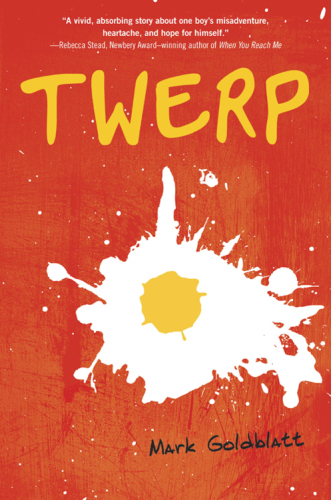
Twerp
Twerp Series, Book 1
فرمت کتاب
ebook
تاریخ انتشار
2013
Lexile Score
730
Reading Level
3
ATOS
4.5
Interest Level
4-8(MG)
نویسنده
Mark Goldblattشابک
9780375971440
کتاب های مرتبط
- اطلاعات
- نقد و بررسی
- دیدگاه کاربران
نقد و بررسی

al3720 - Sounds fun to read.

March 25, 2013
Adult author Goldblatt (Africa Speaks) makes his children’s book debut with a coming-of-age novel set in 1969, a mix of awkward adolescent stumbling, pockets of sweetness, and oft-used tropes. Sixth-grader Julian Twerski has returned from a school suspension and accepted a deal to write a journal for his English class about what he did. As Julian avoids talking about the actual act of bullying that got him in trouble, he recounts the events of the semester in journal entries. These adventures follow the formula for the genre, ranging from uncomfortable first kisses and dates to extracurricular shenanigans (often accompanied by injuries of varied severity); an early sequence about the death of a bird is among the novel’s best and most moving segments. The crucial moment of bullying, although appalling, doesn’t quite live up to its buildup, and the familiar “bully forced to keep a journal” concept is somewhat clichéd. Occasional cultural reference aside, the historical setting doesn’t contribute a great deal to the story, but Julian’s anecdotes are entertaining and Goldblatt’s characters well-written. Ages 9–12. Agent: Scott Gould, RLR Associates.

April 1, 2013
Twelve-year-old Julian is assigned the task of keeping a journal that details the events that led up to his suspension for bullying. In an open journal to his English teacher, Julian describes life as a sixth-grader in 1969, roaming his Queens neighborhood with a close-knit group of friends. While the descriptions and dialogue evoke a previous era, the issues Julian faces are timeless topics familiar to adolescents. Initially, Julian minimizes his responsibility for what happened to "Danley Dimmel," whose real name is Stanley Stimmel. Rather than addressing what occurred, Julian recounts his various mishaps and adventures with his friends. Alternately poignant and comical, Julian's stories encompass everything from first crushes and first dates to the purpose of his existence. He struggles with the conflicting need to be part of a group, which means coasting in his best friend Lonnie's wake, and to define himself and understand his unique place in the world. Goldblatt neatly captures that transitional stage between childhood and adolescence, deftly examining the complex dynamics of friendships and skillfully portraying Julian's evolution toward self-understanding. When Julian ultimately reveals what occurred, he describes it with devastating honesty. Julian's acknowledgement of his part in the event and his decisive actions at the story's conclusion illuminate his growing maturity. Goldblatt's tale provides a thought-provoking exploration of bullying, personal integrity and self-acceptance. (Historical fiction. 10-14)
COPYRIGHT(2013) Kirkus Reviews, ALL RIGHTS RESERVED.

July 1, 2013
Gr 6-8-After participating in an act of horrendous bullying, Julian is given the opportunity to atone for his action and lighten his punishment by writing a book throughout the year. What starts as meandering thoughts and stories about him hitting pigeons and chasing cars evolves into a story of self-realization. The bulk of it is given over to a tangled love triangle. When Lonnie asks Julian, a better writer, to craft a love letter from him to new-girl Jillian and sign it anonymously, she believes the amorous intentions are Julian's. The result leaves bitter feelings between two former best friends. As the story unfolds, Julian comes to identify what he feels is right, not just what his best friend tells him is so. This honest portrayal of 12-year-olds' lives does not gloss over the stupid, hurtful things people do to one another before their moral compasses become fully calibrated. Julian is different from his friends, as he is told throughout the book, but he doesn't see it until the end. In the denouement, he finally stands up and tries to make what he has done right. Not all readers will identify with the sometimes-despicable things the protagonist does, but those who identified with the antihero in Jeff Kinney's "Diary of a Wimpy Kid" (Abrams) but have matured beyond the scope and gravity of that series will find a kindred spirit in Julian.-Devin Burritt, Wells Public Library, ME
Copyright 2013 School Library Journal, LLC Used with permission.

























دیدگاه کاربران